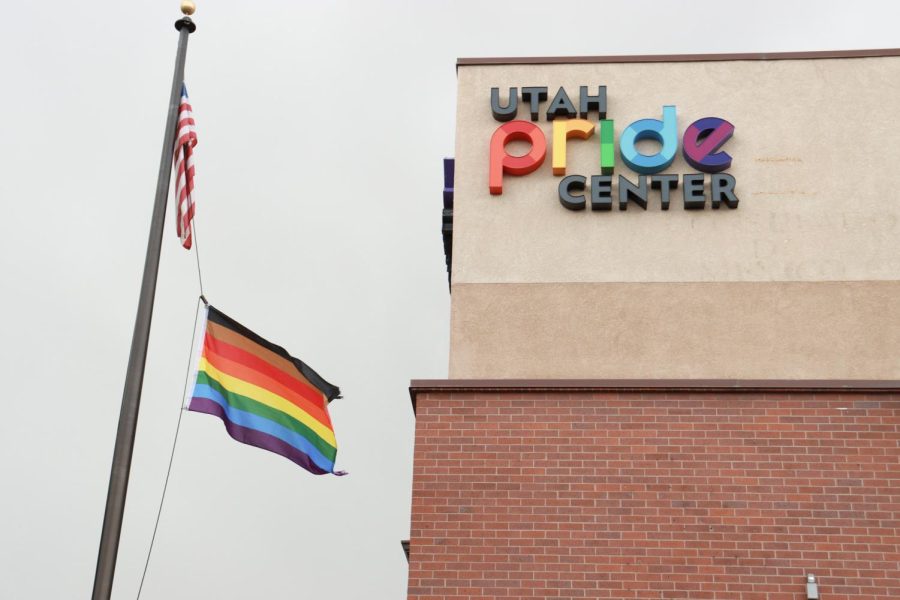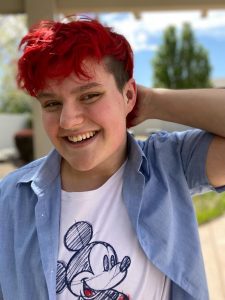Utah Pride Center’s Increased Vendor Fees Frustrate Local Queer Artists, Scholarships Offered
The Utah Pride Center located in Salt Lake City, on Thursday, March 23, 2023. (Photo by Sarah Karr | The Daily Utah Chronicle)
April 3, 2023
In February, the Utah Pride Center announced its vendor prices for their 2023 Pride Festival, themed “Unapologetic.” It appeared to local queer businesses that their prices had tripled, frustrating and disheartening many.
Unapologetically Creative and Queer
Summer Falkenrath of FalkenCraft, a business that sells resin jewelry and accessories like pride pins, keychains, magnets and wall decor, had such a successful tabling at the UPC’s 2022 Pride event that they continuously checked the UPC’s website to be able to register for 2023 as early as possible.
When they first received an email in February to apply, they were shocked at the prices listed for early and late bird fees. They paid $450 for their shared booth last year, which Falkenrath said is already high compared to other markets they have participated in. This year, they posted, prices tripled, asking for $1,500 for an “early bird” application before April 29.
The UPC also sent out information about speaking to someone about financial assistance.
“I emailed them and I got the same copy-pasted paragraph about inflation and fundraising for their programs, which was really disheartening that there wasn’t anything,” they said.
The email explained they would be offering financial assistance to nonprofits.
“I’m a small business, and a full-time artist who has to make money to pay my mortgage and you know, put food on the table,” they said.
They reached out again and received the same copy-pasted email. They were frustrated that their story as a small artist and queer person in the community did not garner a response.
“It was really heartbreaking that there wasn’t really any empathy there,” they said. “Just the same copy-pasted paragraph, which is why I started making some Instagram posts about it.”
The response to the posts showed Falkenrath they were not alone. These prices also came as a stark change to tarot reader and artist Brandee Watters.
“It being my first year last year — it was insanely great,” Watters said. “I couldn’t believe how well-run everything was and everyone was so kind. I’ve done other vendor events and everyone’s always really stressed out. It just seemed like everyone at the Pride Center was willing to pitch in and help.”
Watters identifies as bisexual and polyamorous. She provides creative offerings as a self-proclaimed witch, artist and tarot reader through her small business, Ambiguity Café.
“This year that’s exactly the message our community chose to represent our celebrations in June: being Unapologetic is coming out to celebrate our identities together free from fear and imposed standards, free to express our wholeness and beauty,” read a statement from UPC’s website declaring its “Unapologetic” theme for this year’s Pride Festival.
Watters received an email from the UPC when vendor applications were opened for the 2023 Pride festival and thought that she had clicked into it by mistake, she stated, because the $40 application fee on top of a $1,500 booth fee didn’t seem right.
“It’s about the entire amount I made — not my profits — but the total revenue that I made last year is now the booth [price],” Watters said. “There’s no possible way I could do it, based on [the] numbers.”
Falkenrath and other business owners expressed their concerns about the corporations that can afford the booth prices.
“These corporations that can afford this $1,500 fee are only celebrating pride for 30 days of the year,” they said. “We’re your queer community, celebrating it 365 days a year. You know, I don’t only have pride stuff at my booth in June, I have it at every market ever.”
UPC Responds
After receiving minimal response from the UPC, the center posted there would be a listening forum for small artisans and business owners to express their concerns and be heard. Falkenrath said they were listened to at the forum, and thought it felt “really good.”
According to Jonathan Folk, co-CEO of the UPC and director of Pride, there were seven people in attendance at the listening forum, three of them being business owners themselves, with the rest being friends.
Following the event, Falkenrath said the UPC updated its website to clearly state what their scholarships are.
“There wasn’t any information posted anywhere about it, just emails, which is frustrating because then as someone who has worked in management and at different businesses and stuff, emailing, to me, shows a way that if it’s not transparent, that information could change at any time,” they said. “So they did post their information on scholarships, which was nice to see. … Unfortunately, I know a lot of people who still can’t participate, because it’s still a really high price.”
While they acknowledged they understand the UPC could not give them everything, they wish they had given them more.
“But we still got more than we would have if we wouldn’t have said anything,” Falkenrath said.
Folk said last year, the prices ranged from $400 to $1,500. This year, he said, they start at $375 for a shared booth space, and go to $1,500. Folk said the prices for small businesses, though, have increased. This is due to a variety of factors, including the physical space for the booth, weights for permitting, the table, two chairs, tickets to Friday and Saturday and more. This year, hours are longer, and with other factors, the minimum cost for a booth is $750 — the price for nonprofit, church, school and government entities as well as scholarships.
Folk spoke of other festivals, saying some prices are higher, some are lower, but they are charging for just the space, not the rental amenities that the UPC is providing.
“And those festivals are usually one-day festivals,” he said. “We are a two-day festival with over 150,000 attendees.”
For the first time, the UPC is providing scholarship opportunities “to help offset the cost of the increased pricing.” There are between 25 and 50 scholarships available. To qualify for a scholarship, an artisan would have to make less than $20,000 annually.
Folk said the UPC invited people to come to the center to see their year-round programs and services.
“We invited everyone to come to tour the center as well as to come to the meeting,” he said. “Nobody showed up in person, everybody was virtual.”
After the listening forum, the UPC team got together to create a four-point plan to address the concerns brought up. The first point — a scholarship application.
“The second point is that we came together and said that you can still share booth space with another organization, but you have to apply for the scholarship program as well to be part of that,” he said.
As of March 31, there were 20 applications for scholarship assistance.
“The other part of that is that we offer professional marketing and business insights, so ways to help promote your business,” he said. “You can share your businesses on our social, there are very unique opportunities that we weren’t offering before so that your business can have the best impact during Pride.”
The last part of the plan is to host an LGBTQ business fair at the center, which is free for any vendor.
“The biggest thing we continue to say is come see the center, come see us, come see the work that we’re doing year-round,” he said. “Know that we provide free services year-round and the money raised from Pride helps support our community and helps support our programs and services that we offer.”
Creating Local Queer Community
Recent trends for increased tabling fees at markets like Craft Lake City and the Utah Pride Festival have created barriers for queer crafters. For many, it prevents them from attending or otherwise taking part in the festival and leads to a lack of queer representation.
“I’ve been really saddened by it because it does feel like they’re prioritizing more corporate partners than actually aiding the queer community, which is a lot of the crafting community in Salt Lake,” Watters said. “It really feels like they’re not taking into account the struggles that the queer community is currently dealing with because they’re cutting them out of being vendors at the event.”
But there are other opportunities and spaces to turn to when seeking a creative queer space.
“People are looking for ways to get their craft out, ways to support each other and ways to not have to rely on a big center to bring that opportunity,” Watters said. “I’ve seen a lot of groups come together like, ‘We’re gonna put on our own craft fair.’ I just keep seeing more and more of those pop-ups. That’s giving me a lot of hope and a lot of opportunities as well.”
Current Status
Falkenrath called the current state of things a “conundrum,” saying people are at a loss for what to do now. They said it’s an important market because they know they will be safe at it.
“It’s just been really heartbreaking trying to go through this and trying to make them realize like, ‘Hey, you’re hurting your local queer economy by making it [so] we can’t participate in an event that’s specifically designed to celebrate us,’” they said.
While some businesses may plan to boycott Pride this year, Falkenrath said they are going to find the money to be able to participate because “there are so many people there who need it.”
“I want to still be able to be there because last year I had so many people come to my booth and say that they haven’t found their flag anywhere in the whole Washington Square, except on my little one-inch button that I had,” they said.










Carlos Cubas • Apr 5, 2023 at 11:07 pm
I do attend the events that the Utah Pride Center organizes. But is not only the difficulties of prospective vendors but their audience. Last year the entrance for me was expensive at $25, I went with my wife and a friend, non of us belongs to the LBTTQ communities, but we support them. We found the same vendors as other events that bring SLC, when I talked to them they also complained about it. Some explain that all the equipment and fences, and people have to be paid for. At more than 3 million dollars in entrance revenue, at least they should have better services for paying customers as well as other vendors, last year was boring, and nothing really interesting that we could not find in other events around Salt Lake City. I would propose cultural events besides music, like books, art performances, group discussions, and art expositions, to attract a broader audience, and invite speakers from Utah and other states for the audience that wants to know, understand diversity, and support.